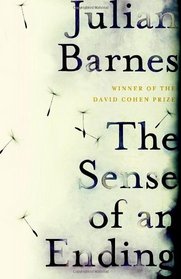I read this book because I'm working my way through books that have won the man booker award as a sort of book project. I usually love books that are introspective but this one left me with a sour memory.
It was written in an utterly pretentious way with none of the depth that the writer was obviously hoping and desperately attempting to instill into the book. None of the characters were likeable or even relate able because they in no way connected with each other.
Yes it's a short book and I did read the whole thing but only out of curiosity as to why exactly this book was awarded anything. Seems to me there were many other more deserving contenders in 2011 that should have beaten this pretentious opaque pile of paper.
It was written in an utterly pretentious way with none of the depth that the writer was obviously hoping and desperately attempting to instill into the book. None of the characters were likeable or even relate able because they in no way connected with each other.
Yes it's a short book and I did read the whole thing but only out of curiosity as to why exactly this book was awarded anything. Seems to me there were many other more deserving contenders in 2011 that should have beaten this pretentious opaque pile of paper.
Helpful Score: 1
No thanks, this reads like something an angrey English Professor would have MADE me read in college. It could not grab my attention at all and despite its short number of pages, I could get through the first 30!
Helpful Score: 1
The Sense of an Ending is a well-crafted retrospective evaluation of the meaning of life, time, and perspective; I can easily see why it was short-listed for the Man Booker Prize in 2011. In Part I, Tony Webster, a self-described peaceable retiree tells us about his adolescent friendships and first failed love; a mysterious legacy jolts him into re-evaluating his life forty years later in Part II, set in modern-day England. Julian Barnes's prose draws you in—it is very easy to keep reading despite the frequent sub-chapter breaks. What Tony says about his friend, "so [he] would take you along on the journey of his thought as if he himself didn't quite believe the ease with which he was travelling ... he made you feel you were his co-thinker, even if you said nothing," (p. 96) applies to this story as well. Thematically it reminds me of Kazuo Ishiguro's work. I enjoyed this new addition to the 2012 version of 1001 books you must read before you die.




